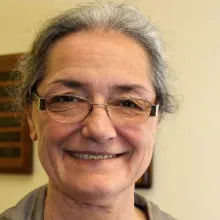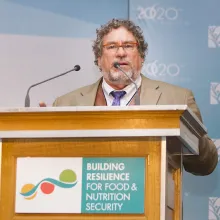When
AIRES International Programs is hosting webinar on the State of the Science of Resilience Measurement in Development with a panel of three international experts in resilience who will discuss ‘state of the art’ and frontier issues related to resilience measurement in the context of international development. The presentations will be followed by Q&A with the audience.
Watch the recording
Panelists

Mark A. Constas, Cornell University
The Goal of Harmonized Resilience Measurement: Toward Core Indicators for Resilience Analysis
Mark A. Constas is an Associate Professor in the International and Development Economics group in the Charles H. Dyson School of Applied Economics & Management at Cornell University. He also holds the position of International Professor of Agriculture and Life Sciences at Cornell and is a Fellow of the Atkinson Center for Sustainability. With a specialization in impact evaluation and measurement, his research is focused on the development of assessment tools and evaluation designs to measure the ways in which households and communities situated in stressed and shock-prone contexts can achieve and maintain well-being. Across all of his work, Professor Constas is interested in exploring how to build better connections between evidence and action. He served as chair of the Resilience Measurement Technical Working Group, an effort jointly coordinated by The United Nations' Food and Agriculture Organization and The World Food Program, with support from the European Union and the United States Agency for International Development. He is currently serving as Director of the Resilience Evidence for Decisions in Development Initiative (REDDI), an initiative that is part of the Global Network Against Food Crises. His work has appeared in a selection of competitive peer-reviewed journals intended for academic audiences and in other publication outlets intended for policy audiences. Professor Constas regularly participates in expert panels on food security and measurement and has served as an advisor to several organizations within the United Nations system.

Nancy Mock
Resilience Metrics in the Wake of COVID-19
Nancy Mock, DrPH is an international development professional with nearly 40 years of professional experience in more than 30 countries. She has established a number of programs within and outside Tulane University in the areas of disaster resilience leadership studies, food security/nutrition, international health, and post Katrina recovery. She led the Newcomb College Center for Research on Women from 2007-2010. More recently, Dr. Mock co-founded and served as inaugural co-director of the Disaster Resilience Leadership Academy initially established in Tulane University’s School of Law. She is a member of the Interagency Technical Working Group on Resilience measurement. She designed and/or mentored major innovative initiatives in early warning, monitoring and evaluation including the Famine Early Warning System (now FEWSNET) and the Standardized Monitoring and Assessment of Relief and Transitions (SMART). She also developed numerous higher education partnership models and networks in service of development objectives. She serves as a senior consultant for the World Food Program, the Food and Agriculture Organization, the Centers for Disease Control, the US Agency for International Development, the Asian Development Bank and numerous non-governmental organizations. Dr. Mock is trained in nutritional epidemiology and international public health. She received a BS in Biology from Yale University and a doctorate in public health from Tulane University. Her current research interests are in the area of disaster resilience, food security and nutrition in humanitarian contexts, linkages between relief and development interventions and information systems.

Tim Frankenberger, TANGO International
TANGO/USAID Approaches for Measuring Resilience
Tim Frankenberger, is the President and co-founder of TANGO and a global expert on food security, livelihood approaches and resilience. Tim has more than forty years of experience in international development, with specialized skills in project design, M&E, and policy analysis. He previously served as Senior Food Security Advisor and Livelihood Security Coordinator at CARE and a farming systems research specialist at the University of Arizona. Tim has published numerous articles on household food security and resilience. Tim’s graduate work includes an MA as well as doctoral studies in Anthropology with a minor in Agricultural Economics. His current research interests include resilience measurement in food insecure contexts.

